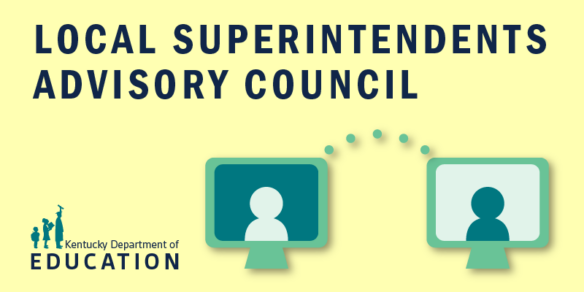
Members of the Kentucky Department of Education’s (KDE’s) Local Superintendents Advisory Council (LSAC) voted to approve 704 KAR 8:130, the regulation related to the revised Kentucky Academic Standards (KAS) for Visual and Performing Arts, during the council’s meeting on May 28. The regulation will next be presented to the Kentucky Board of Education (KBE) at its meeting on June 5-6.
Micki Ray, chief academic officer for KDE’s Office of Teaching and Learning, reviewed KRS 158.6453, which states that every six years beginning in fiscal year 2017-2018, KDE shall implement a comprehensive process for reviewing and revising the academic standards in visual and performing arts.
“Part of the process that is required in law is the active participation of Kentucky educators. I just want to thank districts and superintendents for allowing us access to your teachers, because without your willingness to collaborate, we would not be able to complete the process as required in law,” said Ray.
There were numerous steps to review and revise the KAS for Visual and Performing Arts, including seeking public comment on both the standards and recommended revisions, said Chrystal Rowland, division director in KDE’s Office of Teaching and Learning.
Rowland said two public comment periods were held, yielding 146 responses from current and past educators, administrators, guardians, postsecondary educators, business and community members, and students. The standards review committee also solicited feedback through focus groups with student representatives, leaders from state arts organizations, educational cooperatives, district art directors, coordinators and instructional leaders; and representatives of statewide, discipline-specific arts organizations.
Rowland said there were four main needs reflected through the first round of public comment to guide the standards revision. Commentors said the standards should:
- Be written in clear and precise language;
- Be developmentally appropriate and processed logically across grade levels;
- Be aligned with research-based artistic processes for arts education; and
- Should allow for teacher autonomy, while still providing clarity for new teachers.
The revised standards include the 11 anchor standards aligned with the national core arts standards. The anchor standards were divided into four artistic processes: creating; performing, producing and presenting; responding and connecting.
“These are beautiful opportunities for students to develop the competencies that we would want for all of our learners,” said Rowland.
Other revisions to the visual and performing standards include the addition of a discipline-specific glossary and the document was reorganized by discipline. Disciplines include dance, media arts, music, theater and visual arts.
Rowland said that more than 75% of respondents accepted the revised standards “as is,” with the remaining 25% including a positive response with confirmation of acceptance.
“We saw that people appreciated the architecture in the revised standards, which created an increase in usability for teachers and that the language and clarity were improved through the revision process,” said Rowland.
Work-Based Learning
Beth Hargis, associate commissioner in KDE’s Office of Career and Technical Education, provided an update on work-based learning experiences.
Work-based learning incorporates structured, work-based learning activities into the curriculum, allowing a student to apply knowledge and skills learned in class and connect these learning experiences in the workplace.
Kentucky has 753 traditional work-based learning experiences currently reported in Infinite Campus that are aligned to a career and technical education pathway and course code for accountability approval, Hargis said.
“These students will be designated as postsecondary ready, and these experiences will be included as a measure of accountability,” Hargis said.
Hargis said she predicts the number of applications for traditional work-based learning experiences will increase, as districts have until July 31 to turn in their traditional work-based learning applications.
Hargis also provided an update about work-based learning experiences completed outside of the regular school day that are not included as a high school course. This option is available, Hargis said, due to an amendment last year to KRS 158:6455.
The regulations which guide the approval process of this new work-based learning experience are 703 KAR 5:270 and 705 KAR 4:041, which stipulate that successful completion must be observed with a minimum of 300 hours; the experience must align with a credential or associate degree; and the student must attain sufficient skills and knowledge in the experience.
Hargis said KDE received 42 applications by the May 1 deadline for the current school year.
“We completed a thorough review process and determined that eight of those applications, or 19%, met the criteria for approval,” said Hargis.
Hargis said the applications were reviewed twice to ensure they were approved according to the statute and regulations, in addition to input from KDE leadership.
“As with any new initiative, there has been a learning curve and we anticipate that going forward we will have increased applications and approvals,” said Hargis.
In other business, LSAC took action to recommend the KBE:
- Approve for the repeal of 704 KAR 3:303, Required Academic Standards; and
- Approve amendments to various sections of 702 KAR 3:320, Finance Officer Certification Requirements.
The regulations recommended for approval during the LSAC meeting will be up for consideration during the KBE meeting on June 5-6.

